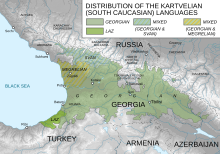 Distribution of the Svan language in relation to other Kartvelian (South Caucasian) languages. | |
| Total population | |
|---|---|
| c. 14,000[1]–80,000[2] | |
| Regions with significant populations | |
| 14,000[1]–30,000[2] | |
| 45 (2010)[3] | |
| Languages | |
| Svan, Georgian | |
| Religion | |
| Predominantly † Eastern Orthodox Christianity (Georgian Orthodox Church) | |
| Related ethnic groups | |
| Georgians, the Laz and Mingrelians | |
The Svans (Svan: შვანარ, Shvanar; Georgian: სვანი, Svani) are an ethnic subgroup of the Georgians (Kartvelians)[4][5][6][7][8][9][10] living mostly in Svaneti, a region in northwest Georgia. They speak the Svan language and are mostly bilingual also in Georgian. Both these languages belong to the Kartvelian (South Caucasian) language family. In the pre-1930 Soviet census, the Svans were afforded their own "ethnic group" (natsional'nost) category.[11] The self-designation of the Svan is Mushüan, which is probably reflected in the ethnonym Misimian of the Classical authors.[12]
YouTube Encyclopedic
-
1/2Views:16 8652 886
-
Svan Song: Svans Proud Kartvelians (Georgians)! Svans, northern Georgians
-
Med hest og svans på Norsk Skogmuseum
Transcription
History

| Part of a series on |
| Georgians ქართველები |
|---|
 |
| Nation |
| Georgia |
| Ancient Kartvelian people |
| Subgroups |
| Culture |
| Languages |
| Religion |
| Symbols |
| History of Georgia |
The Svans are usually identified with the Soani mentioned by Greek geographer Strabo, who placed them more or less in the area still occupied by the modern-day Svans.[citation needed]
In the Russian Empire and early Soviet Union Mingrelians and Svans had their own census grouping, but were classified under the broader category of Georgian in the 1930s. They are Georgian Orthodox Christians, and were Christianized in the 4th–6th centuries. However, some remnants of pre-Christian beliefs have been maintained. Saint George (known as Jgëræg to the locals), a patron saint of Georgia, is the most respected saint. The Svans have retained many of their old traditions, including blood revenge, although this tradition has been declining over time and as law enforcement takes hold. Their families are small, and the husband is the head of his family. The Svan strongly respect the older women in families.
Language
Typically bilingual, they use both Georgian and their own, unwritten Svan language. Prior to the 19th century, many Svans were monolingual, only knowing the Svan language.[13] However, Svan is being largely replaced by Georgian, which is the language of culture and education in Georgia.
Genetics
The most common Y-chromosomal haplogroup among the Svans is G2a (90%), in the second place is the Y-chromosomal haplogroup R1a (5%), in the third place is the Y-chromosomal haplogroup J2a1 (about 3%). Among mitochondrial haplogroups H (17.9%), K (15.8%), W6 (13%), T (9.24%), U1 (7.61%), X2 (6, 52%), U2 (5.98%) are common haplogroups.[14][15]
Famous Svans
- Temur Babluani (1948-), film director, script writer, and actor
- Géla Babluani (1979-), Georgian-French film director
- Mikheil Gelovani (1893–1956), actor who primarily portrayed Stalin
- Otar Ioseliani (1934-), film director in Georgia
- Mikheil Kurdiani (1954-2010), philologist, linguist, writer, poet and translator
- Sopho Gelovani (1984-), singer
- Tariel Oniani (1952-), mafia boss
- Yaroslav Iosseliani (1912-1978), Soviet Navy submarine commander
- Nana Ioseliani (1962-), chess player
References
- ^ a b Project, Joshua. "Svanetian, Mushwan in Georgia". Retrieved 18 August 2017.
- ^ a b "Svan/Udi/Tsova-Tush - DOBES". Retrieved 18 August 2017.
- ^ "Russian census 2010". Retrieved 18 August 2017.
- ^ Stephen F. Jones. Svans. World Culture Encyclopedia. Retrieved on March 13, 2011: «The Svans are one of the dozen or so traditionally recognized ethnic subgroups within the Georgian (Kartvelian) nation.»
- ^ The Svans Kevin Tuite Université de Montréal 1992: «The Svans are one of the dozen or so traditionally recognized ethnic subgroups within the Georgian (Kartvelian) nation.»
- ^ Britannica. Caucasian peoples: «The Caucasian peoples ... The southerners, comprising the Georgians, the closely related Mingrelians and Laz, and the Svan, make up the Republic of Georgia and live in western Transcaucasia (the Laz live in Turkish territory).»
- ^ R. Wixman. The Peoples of the USSR: An Ethnographic Handbook (p.181): «Svan ... The Svanetians are one of the Kartvelian peoples of the Georgian SSR»
- ^ Levinson, David. Ethnic Groups Worldwide: A Ready Reference Handbook. Phoenix: Oryx Press, 1998. p 35
- ^ "СВАНЫ - это... Что такое СВАНЫ?". Retrieved 18 August 2017.
- ^ "Сваны - это... Что такое Сваны?". Retrieved 18 August 2017.
- ^ "Демоскоп Weekly - Приложение. Справочник статистических показателей". demoscope.ru. Retrieved 18 August 2017.
- ^ History of Georgian Mountein Regions / R. Topchishvili. Available at The National Parliamentary Library of Georgia
- ^ Tuite, Kevin. "Svan and its speakers" (PDF). Université de Montréal. p. 2. Archived (PDF) from the original on 2022-10-23. Retrieved 2022-12-08.
Up to the 19th century, many Svans were monolingual,
- ^ Yardumian A. et al. Genetic diversity in Svaneti and its implications for the human settlement of the Highland Caucasus, 2017
- ^ Генетический портрет сванов на фоне народов Южного Кавказа


